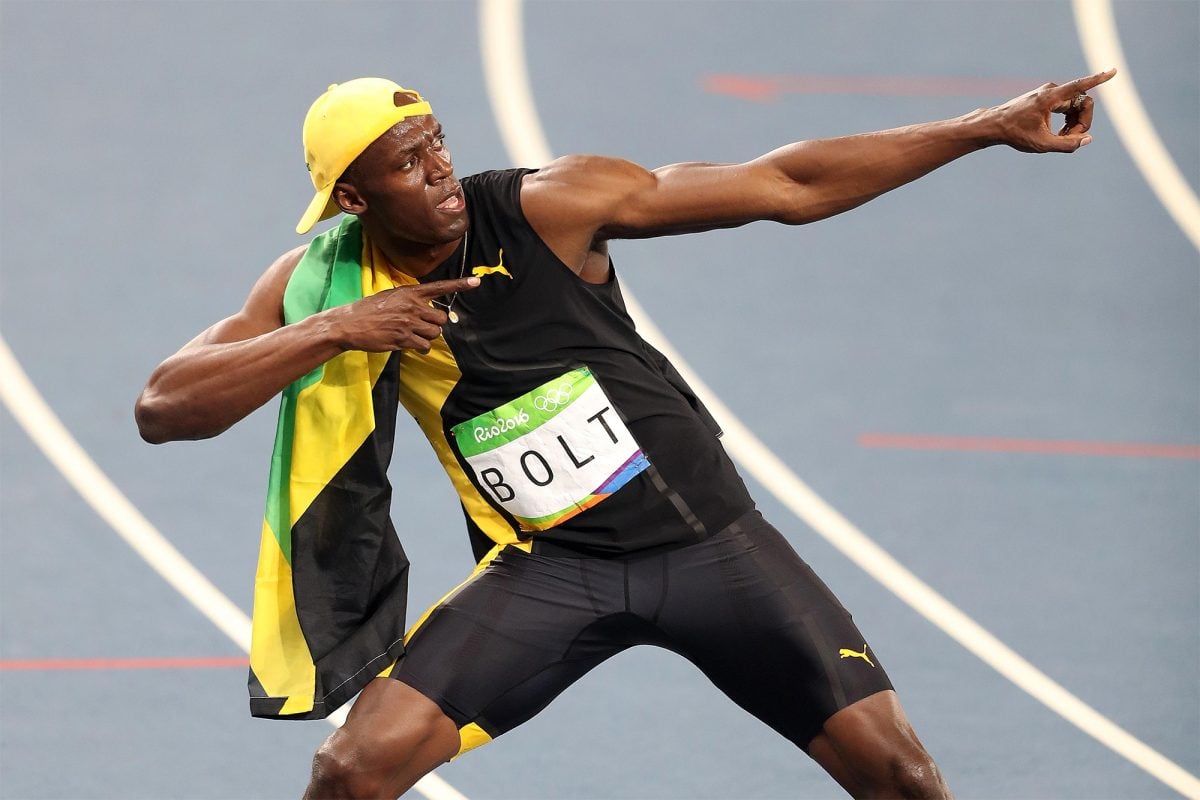Usain Bolt Moves To Trademark His Dancehall-Inspired “To Di World” Pose

A-Team producer Usain Bolt has filed an application with the US Patent and Trademark Office to protect and capitalize on his own “To Di World” signature pose. However, most people, including some Jamaicans, are not aware that the name and the pose are creatures of the Dancehall space.
According to Bloomberg, the sprint icon filed the application on August 17 for the ‘To Di World’ logo to be used in connection with products including jewelry, clothing, bags and purses, sunglasses, shoes and sporting goods, as well as restaurants and sports bars offering services such as VIP areas, catering and loyalty plans.
His US filing requests protection for: “The silhouette of a man in a distinctive pose, with one arm bent and pointing to the head, and the other arm raised and pointing upward.”
Bloomberg noted that Bolt had applied for trademarks for the pose 12 years ago, but those were abandoned after going unused early in his career.
Usain struck what is now his signature pose following Jamaica’s 100-metre sprint team’s world-record-breaking performance at the Beijing Olympics in 2008, where he also obliterated the 100 and 200 metres world records and cemented himself as the fastest man in history.
From then, the William Knibb Memorial High School old boy had struck the pose on the track, at press conferences, and at every public event. For more than a decade many famous persons globally, including President Barack Obama, Prince Harry and Brazilian footballer Neymar and even Ambassadors to Jamaica, have copied the To Di World pose as a means of appearing ‘cool’.
Back in 2016, Bolt had told Yahoo News in a video interview that the pose was a derivative of a Jamaican dance called To the World.
The dance though, which accompanied the clip of Bolt’s interview, however, was the Thunder Clap, from which his pose appears to be a variation.
The Thunder Clap dance was first used by Elephant Man in his 2007 song Get Up and Dance on the Thrilla riddim, which was rotated heavily in the Dancehall space leading into the Olympic year, and in which the Energy Gad instructed listeners to do a series of dance moves.
In August 2008, the Olympic year, there was also a Dancehall riddim released titled To The World (originally titled Up and Live), a bouncy beat produced by Arif Cooper on his Fresh Air label, which featured songs such as Sean Paul’s Midas Touch, Elephant Man’s Pum Pum Pum, Vybz Kartel’s Body Wine, TOK’s Sexy and Ready and Voice Mail’s Up and Live.
Usain, in another interview in Jamaica a few years ago, had explained that he had always wanted to have a signature pose. He had said that at first, he had decided to depict an archer with a bow and arrow, standing in the shooting position whilst aiming at a target like the famed William Tell.
However, the Sherwood Content native had said he decided to tweak the pose a little and point towards the sky instead, to make it uniquely his and to make it appear non-violent.
Two Olympics later, in 2016, USA Today noted in an article that “sadly, no one can quite remember where the To Di World move first originated from although, unsurprisingly given Bolt’s success, many people have tried laying claim to it since”.
During the Tokyo Olympics in August last year, the A-Team producer had expressed concerns about corporate entities exploiting the image rights of athletes who competed at the Games.
The Clockwork producer had sparked a firestorm after he posted on his social media pages that Jamaica’s Olympians ought not to allow their images and brands to be exploited by ‘bandwagonist’ corporate entities who did not assist their Tokyo Olympic quest.
“A lot Athletes sought support from corporate Jamaica in their preparation leading up and heading to Olympic Games and got NO HELP. Athletes know your Worth/Power now that they all want to jump onto your Brand/Image for free,” Bolt had stated.
In 2021, Bolt had warned Jamaican elite athletes to not allow their images and brands to be exploited by corporate entities without adequate compensation,
